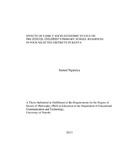| dc.description.abstract | ABSTRACT
The study examined the effect of Family Socio-Economic Status (SES) on pre-school children‟s Primary School Readiness (PSR) in Westland, Kasarani, Lari and Ganze districts in Kenya. In the study, family SES was indicated by the economic and social resources, parents‟ education level and occupational status; family structure as well as residence location. Accordingly, Primary School Readiness was measured through a composite score of the child‟s language and social-emotional competency. The study adopted developmental and family process theoretical models and followed a correlation and comparative design to explicate the separate and concurrent impact of family SES on children‟s language and social-emotional competencies. The districts were purposively sampled to represent not only urban and rural divide but also socioeconomic diversity. A sample of 368 pre-school children aged five and six years old and an equivalent number of their primary caregivers who were mainly parents were involved in the study. A Pre-school Children‟s School Readiness Assessment Rating Scale (PCSRARS) and a Primary Caregiver Interview Schedule (PCIS) were the main data collection instruments. Descriptive and inferential statistics was used to describe and compare the findings, while standard correlation analysis and multiple regression modeling techniques were used to explicate the relationship and the separate and concurrent effects of family SES on School Readiness measures. The key findings of the study were that: comparatively, family social capital exerted more effect on children‟s primary school readiness than financial resources. In addition, children in nuclear families with fewer children (less than three) outperformed their peers in families with more than three children and in extended family structures. In urban families, presence of grandparents in the home had no significant influence on children‟s school readiness unlike in rural areas where presence of grandparents had a positive correlation with children‟s school readiness outcomes. The mother‟s education level had a curvilinear relationship with influence on school readiness stabilizing at diploma level after which educational level indicated a negative correlation with school readiness. It was also apparent that, father‟s residency status and education level positively influenced children‟s school readiness. Parents‟ occupations that were more prestigious had positive correlation with school readiness as compared to lower cadre occupations or unemployment. In addition, the mother‟s occupational status exerted more influence as compared to the father‟s occupational status. Generally, children in relatively more endowed neighbourhood had better school readiness performance irrespective of rural or urban location. Multiple regression modeling showed that, family social capital and parents‟ level of education had more influence on school readiness outcomes as compared to other family SES variables. The study recommended that, Government develops and implement policies that promote early learning stimulation at family level, work places and link ECDE and primary education. If the recommendations are implemented, it would significantly promote school readiness, contribute towards reducing dropout, absenteeism, and improve completion rate in primary education. | en |

